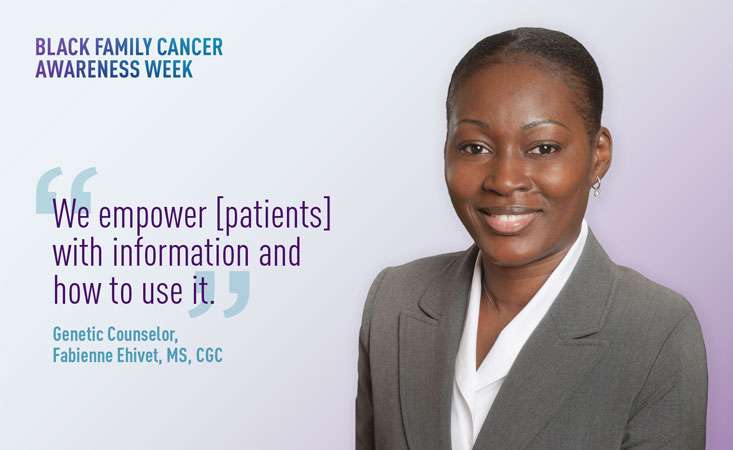
Editor’s Note: PanCAN kicks off Black Family Cancer Awareness Week with a conversation with Fabienne Ehivet, a licensed and certified genetic counselor. Throughout the week, we’ll be featuring interviews and conversations with members of the Black community making a difference for patients with pancreatic cancer and their families. This story originally published during Black History Month.
Fabienne Ehivet, MS, CGC, is always happy when someone skeptical of genetic counseling comes to her and leaves convinced of its benefits.
“I love when a patient says, ‘I didn’t know what this was going to be about but I’m really happy that I came,’” she said. “Patient feedback in terms of learning from the session is what is most important.”
As a licensed and certified genetic counselor at Emory Winship Cancer Institute in Atlanta, Fabienne talks with patients about how genetic risk factors may affect them or their families. She specializes in cancer, so most of her patients have questions about their personal or family history of cancer or hereditary cancer syndromes in general.
For pancreatic cancer, about 5-10% of cases are considered hereditary. This means a mutation in DNA passed from generation to generation causes the disease. Genetic counseling helps people understand their cancer risk and make informed choices about risk management and prevention.
Fabienne is especially passionate about increasing awareness of the benefits of genetic counseling in the Black community, as Black Americans are more likely to be diagnosed with pancreatic cancer than any other racial or ethnic group. Generations of systemic racism means some in the Black community may be wary of genetic testing and counseling.
“There’s a lot of mistrust of the medical field,” she said. “They’re also worried about discrimination. Fear of being taken advantage of, or not being cared for, can affect their interest in getting genetic counseling or testing, unfortunately.”
Her role is to help patients understand the benefits of genetic counseling and to be a guide through the process, taking her cues from the patients about what they need for support.
“We don’t talk only about the science,” she said. “We also want to know the person and how they’re dealing with everything that is happening to them. We want them to feel like they’re being taken care of.”
When Fabienne meets with a patient for the first time, she starts out by taking a family history and completing a risk assessment. She can talk through costs and questions about payment – often insurance will cover testing and counseling if a patient’s history and assessment shows an increased risk for cancer.
Genetic testing can be done the same day as that initial visit through a blood test. A saliva test is also an option for patients who consult with her via telehealth. Results often take two to three weeks to come in, although they can be expedited for patients who need the genetic information to make a decision about surgery.
Once the results come back, a second appointment is scheduled.
“This is really the most important part: What do the results mean? What does it mean for the patient first, and what does it mean for family members?”
Depending on the patient, results may impact decisions about surgery or whether a certain treatment may be beneficial. If hereditary risk is uncovered, there are discussions about which family members may benefit from genetic testing and counseling.
“We give them resources so that they can share that information with the family,” she said. “We let them know who needs to see us, or who may not need to come see us.”
For Fabienne, who joined the staff at Emory Winship Cancer Institute in 2015 after receiving a graduate degree in genetic counseling in 2012, it’s gratifying to walk with patients through a journey that brings new knowledge and sometimes difficult decisions.
“Some patients come in and they’re very anxious, so we have tools to help them calm down,” she said. “We empathize with them and how they’re perceiving the risk. Then, we empower them with information and how to use it.”
If patients need more support than she can provide during the visit, Fabienne said genetic counselors can refer patients to other mental health professionals. And she always remains available and present for patients if they have additional questions or need to talk through anything.
That opportunity to help people is what drew her to the field. After initially studying nutrition and food science, she realized that she wanted to build long-standing relationships with people and found her way to genetic counseling, a field that combines science and human connection.
“Helping patients, being there for them, guiding them and taking time with them – that’s important,” she said. “The journey of a cancer diagnosis can be confusing. We try to help make sense of everything for them.”
If you are a first-degree relative of someone diagnosed with pancreatic cancer, your family member with pancreatic cancer is strongly recommended to undergo genetic testing for inherited mutations. Negative results often mean you do not need to get genetic testing.
If the results are positive, unknown or if you have several close family members with cancer, PanCAN recommends you consult with a genetic counselor to determine if you should get genetic testing for inherited cancer risk and if you should discuss options for monitoring.














